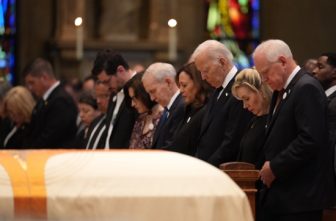
Research has shown that saying “thank you” does more good than one might think.
“I really look at gratitude as being a way of seeing that really alters our view of the world,” said Mary Jo Kreitzer, who recently led a gratitude research study at the University of Minnesota. “When we come with a perspective of gratitude, I think that shapes what we notice in our lives.”
Kreitzer, the director and founder of the Center for Spirituality and Healing at the university, said she has also read “hundreds of studies” that show the benefits of practicing gratitude. Kreitzer is also a nursing professor at the university, and her work at the Center for Spirituality and Healing involves research and educating about integrated healing in the medical field.
“They have found that gratitude helps increase optimism, reduce hopelessness, decreases stress, decreases depression [and] improves sleep,” she said about the studies.
Sister of St. Joseph Carolyn Puccio, a licensed psychologist, said gratitude benefits people on both a faith level and a natural level. She said it’s central to life for Catholics because “we are a eucharistic people” and “it’s the foundation of who we are.”
“Gratitude feeds the soul [and] gives the soul energy and peace,” said Sister Carolyn, delegate for consecrated life in the Archdiocese of St. Paul and Minneapolis. “It’s important to have that foundational, healthy attitude as persons.”
The word “Eucharist” means “thanksgiving,” and in the Mass, the eucharistic prayer emphasizes gratitude with the words “it is truly right and just, our duty and our salvation, always and everywhere to give you thanks.”
Father Tom Margevicius, director of the archdiocesan Office of Worship, said St. Thomas Aquinas “considered ingratitude the most grievous sin possible” in his “Summa Theologiae.”
Kreitzer noted that the majority of the University of Minnesota’s recent gratitude study participants identified themselves as Christian. The university partnered with CaringBridge for the study to explore how gratitude helps people with health issues. Participants completed two online surveys and committed to writing down three things for which they are thankful daily over a 21-day period.
Outcomes the researchers looked for included impact on stress, gratitude and social support. They had 882 participants in the study, 55 percent of whom were senior citizens, and 73 percent of whom were CaringBridge website visitors. CaringBridge is a website that helps people communicate about a loved one’s illness.
“Another really interesting finding from the study was that 69 percent reported that they practiced the gratitude practice five or more days a week,” Kreitzer said of recording the three things. “We did find that people who practiced more did have a greater reduction in stress.”
While the majority of the study’s participants were senior citizens, Kreitzer said she hasn’t seen gratitude studies that focus on senior citizens in particular. However, she said gratitude is useful in the later years of life for doing “legacy work,” or people reflecting on their lives.
But gratitude is beneficial for all ages, she added.
“It trains you to begin to notice the positive in life,” Kreitzer said.
Jesuit Father Patrick McCorkell said it helps people recognize God’s blessings and providence in their lives, and it helps people overcome selfishness.
“It’s our basic stance toward God,” said Father McCorkell, the director of the Demontreville Jesuit Retreat House in Lake Elmo.
Kreitzer said that the studies she has done and explored don’t distinguish between gratitude toward people and gratitude toward God, but spirituality and religion have their place in practicing gratitude.
“There’s prayers of thanksgiving and there’s prayers of gratitude that certainly fall within all kinds of religious traditions,” Kreitzer said.
Father McCorkell recommends the practice of the “Examen,” which St. Ignatius of Loyola, the founder of the Jesuits, developed. The “Examen” consists of reflecting on one’s day regarding how God was at work in it and one’s response to God’s graces. Father McCorkell said he’s seen men at Demontreville deepen in gratitude over the years as they make their annual retreat there.
“You become grateful a lot more often and in different situations,” Father McCorkell said.
The Thanksgiving holiday provides an opportunity to improve the practice of gratitude. Sister Carolyn encouraged using Thanksgiving dinner as an opportunity to for each person to share what their grateful for.
“Sometimes I think we might be surprised at what people have come to feel grateful for because with a certain maturity it’s possible to be grateful for even the difficult things,” Sister Carolyn said.





‘We are in this together’: Recent Supreme Court rulings support parents in their vocation